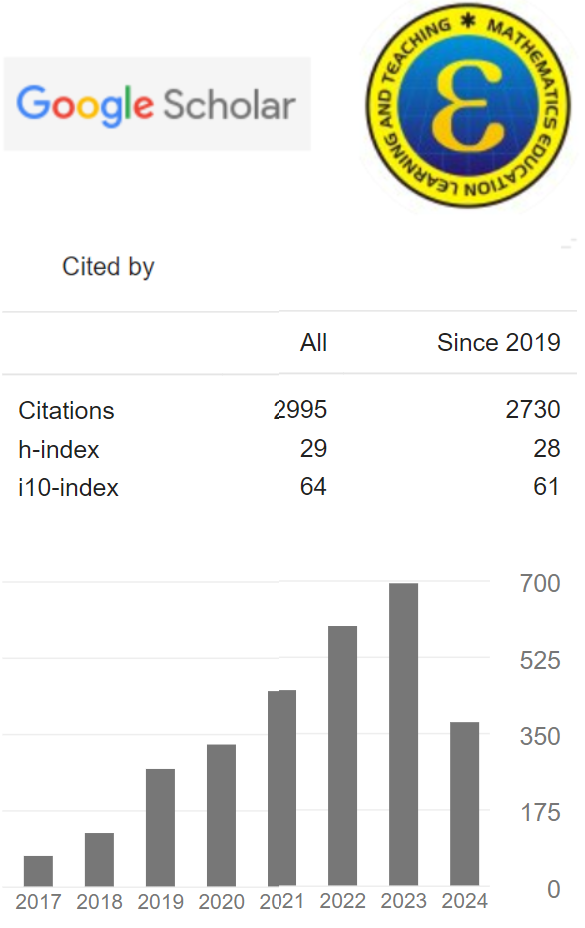Analysis of Students' Errors in Solving the Least Common Multiple and Greatest Common Divisor Word Problems
(1) Universitas Negeri Malang
(2) SMP IT Al-Fahmi Palu
(*) Corresponding Author
Abstract
Keywords
Full Text:
PDFReferences
Agustiani, N. (2021). Analyzing Students’ Errors in Solving Sequence and Series Application Problems Using Newman Procedure. International Journal on Emerging Mathematics Education, 5(1), 23. https://doi.org/10.12928/ijeme.v5i1.17377
Boonen, A. J. H., de Koning, B. B., Jolles, J., & van der Schoot, M. (2016). Word Problem Solving in Contemporary Math Education: A Plea for Reading Comprehension Skills Training. Frontiers in Psychology, 7. https://doi.org/10.3389/fpsyg.2016.00191
Clements, M. A. (1980). Analyzing children’s errors on written mathematical tasks. Educational Studies in Mathematics, 11(1), 1–21. https://doi.org/10.1007/BF00369157
Creswell, J. W., & Creswell, J. D. (2017). Research design: Qualitative, quantitative, and Mixed Methods Approaches. Sage publications.
CsÃkos, C., & Szitányi, J. (2020). Teachers’ pedagogical content knowledge in teaching word problem solving strategies. ZDM, 52(1), 165–178. https://doi.org/10.1007/s11858-019-01115-y
Fitriani, H. N., Turmudi, T., & Prabawanto, S. (2018, December). Analysis of students error in mathematical problem solving based on Newman’s error analysis. In International Conference on Mathematics and Science Education of Universitas Pendidikan Indonesia (Vol. 3, pp. 791-796).
Gonzálezâ€Castro, P., Cueli, M., Areces, D., RodrÃguez, C., & Sideridis, G. (2016). Improvement of Word Problem Solving and Basic Mathematics Competencies in Students with Attention Deficit/Hyperactivity Disorder and Mathematical Learning Difficulties. Learning Disabilities Research & Practice, 31(3), 142-155. https://doi.org/10.1111/ldrp.12106
Granberg, C. (2016). Discovering and addressing errors during mathematics problem-solving—A productive struggle? The Journal of Mathematical Behavior, 42, 33–48. https://doi.org/10.1016/j.jmathb.2016.02.002
Han, C. T., Singh, P., Nasir, N. A. M., Ramly, M. A., & Hoon, T. S. (2016). Error in Solving Mathematical Word Problem: A Study of Preparatory Diploma Program. In C. Y. Fook, G. K. Sidhu, S. Narasuman, L. L. Fong, & S. B. Abdul Rahman (Eds.), 7th International Conference on University Learning and Teaching (InCULT 2014) Proceedings (pp. 399–408). Springer Singapore. https://doi.org/10.1007/978-981-287-664-5_32
Hu, Q., Son, J.-W., & Hodge, L. (2021). Algebra Teachers’ Interpretation and Responses to Student Errors in Solving Quadratic Equations. International Journal of Science and Mathematics Education. https://doi.org/10.1007/s10763-021-10166-1
Jupri, A., & Drijvers, P. (2016). Student difficulties in mathematizing word problems in algebra. Eurasia Journal of Mathematics, Science and Technology Education, 12(9), 2481-2502. https://doi.org/10.12973/eurasia.2016.1299a
Khalo, X., Bayaga, A., & Wadesango, N. (2015). Error Analysis: Case of Pre-service Teachers. International Journal of Educational Sciences, 9(2), 173–179. https://doi.org/10.1080/09751122.2015.11890307
Powell, S. R., Berry, K. A., & Barnes, M. A. (2020). The role of pre-algebraic reasoning within a word-problem intervention for third-grade students with mathematics difficulty. ZDM, 52(1), 151–163. https://doi.org/10.1007/s11858-019-01093-1
Reid O’Connor, B., & Norton, S. (2020). Supporting indigenous primary students’ success in problem-solving: Learning from Newman interviews. Mathematics Education Research Journal, 1-24. https://doi.org/10.1007/s13394-020-00345-8
Rushton, S. J. (2018). Teaching and learning mathematics through error analysis. Fields Mathematics Education Journal, 3(1), 1-12. https://doi.org/10.1186/s40928-018-0009-y
Singh, P., Rahman, A. A., & Hoon, T. S. (2010). The Newman Procedure for Analyzing Primary Four Pupils Errors on Written Mathematical Tasks: A Malaysian Perspective. Procedia - Social and Behavioral Sciences, 8, 264–271. https://doi.org/10.1016/j.sbspro.2010.12.036
Slavin, R. E. (2018). Educational Psychology: Theory and practice.
Sukoriyanto, S., & Desmayanti, N. (2021, March). Analysis of student errors in solving linear programming problems based on Newman’s procedures in terms of writing mathematical communication capabilities. In AIP Conference Proceedings (Vol. 2330, No. 1, p. 040002). AIP Publishing LLC. https://doi.org/10.1063/5.0043383
Trapsilasiwi, D., Murtikusuma, R. P., Oktavianingtyas, E., Wiliandani, I., & Widodo, D. M. (2021, May). Analysis of Introverted Students’ Error Based on Newman in Solving Arithmetic Sequences and Series Problems. In 1st International Conference on Mathematics and Mathematics Education (ICMMEd 2020) (pp. 371-375). Atlantis Press. https://doi.org/10.2991/assehr.k.210508.090
Van Dooren, W., Lem, S., De Wortelaer, H., & Verschaffel, L. (2019). Improving realistic word problem solving by using humor. The Journal of Mathematical Behavior, 53, 96–104. https://doi.org/10.1016/j.jmathb.2018.06.008
Verschaffel, L., Schukajlow, S., Star, J., & Van Dooren, W. (2020). Word problems in mathematics education: A survey. ZDM, 52(1), 1–16. https://doi.org/10.1007/s11858-020-01130-4
White, A. L. (2005). Active mathematics in classrooms: Finding out why children make mistakes–and then doing something to help them. Square one, 15(4), 15-19.
Wijaya, A., van den Heuvel-Panhuizen, M., Doorman, M., & Robitzsch, A. (2014). Difficulties in solving context-based PISA mathematics tasks: An analysis of students' errors. The Mathematics Enthusiast, 11(3), 555-584. https://doi.org/10.54870/1551-3440.1317
Wong, T. T. Y., & Ho, C. S. H. (2017). Component processes in arithmetic word-problem solving and their correlates. Journal of Educational Psychology, 109(4), 520. https://doi.org/10.1037/edu0000149
Woodward, A., Beswick, K., & Oates, G. (2017). The four proficiency strands plus one?: Productive disposition and the Australian Curriculum: Mathematics. In 2017 Mathematical Association of Victoria Annual Conference (MAV17) (pp. 18-24). https://www.mav.vic.edu.au/files/2017/MAV17-Conference/Conference_Proceedings_011217.pdf
DOI: 10.24235/eduma.v11i2.9324
Article Metrics
Abstract view : 49 timesPDF - 10 times
Refbacks
Copyright (c) 2022 Eduma : Mathematics Education Learning and Teaching


.png)










